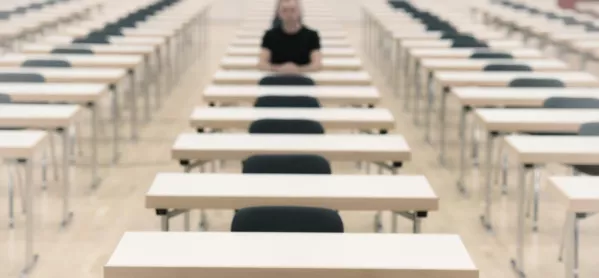GCSE and A-levels: 5 problems with the shift from exams

As expected, education secretary Gavin Williamson has today confirmed what prime minister Boris Johnson had previously hinted at: GCSE and A Level examinations will not be going ahead for the second year in a row.
Instead, student grades will be based on internal teacher assessment, albeit without the algorithm that was used last year - the one that caused such a furore.
“This year we’re going to put our trust in teachers rather than algorithms,” was Williamson’s way of putting it.
GCSE exams shift
On the surface, this perhaps sounds like a better system than the solution last year - one that gives more autonomy to teachers.
But the reality is far more complicated and throws up many questions without clear - or easy - answers.
1. More work for GCSE and A-Level teachers?
For starters, moving from externally to internally assessed examinations poses some serious logistical challenges. The detail is still lacking, but we can surmise that there is going to be an expectation on schools to conduct their own assessments on their students.
This will require some careful negotiation of the academic calendar. Will there be enough time for schools to set, mark and moderate these assessments if they take place during the planned exam weeks?
It’s more likely that these processes will eat into teaching time, with assessments taking place earlier on in the term than usual.
2. A need for trained exam markers?
There was also a noticeable lack of allusion to the awarding bodies in Williamson’s speech. What role, if any, will they play in this process?
Perhaps they will provide the promised “training and support” for teachers to mark and moderate assessments.
This is something that schools are likely to need, as marking to help a student improve, and marking to judge ability are two very different skills.
Teachers are well practised in the former, but the latter is one that comes with the training and experience of being an examiner. And while many teachers choose to mark exam scripts, not everyone will already have this experience.
3. An issue with the student-teacher dynamic?
Another thing that teachers listening to the speech today would have picked up on is Williamson’s insistence that trust is now going to be with teachers “rather than algorithms.”
Putting aside thoughts about how much the Department for Education trusted teachers when it threatened schools with legal action for closing to prevent the spread of coronavirus, this puts teachers and school and college leaders into a difficult position.
On the one hand, they are being trusted with grading students - and who could know and understand their students more than the teachers who have been in the classroom with them every day?
But on the other hand, this plants the responsibility for these grades squarely on teachers shoulders.
It doesn’t feel accidental that these are being called “teacher assessed grades”, rather than “centre assessed grades”. Without an external awarding body to moderate and ratify the grades, it will be teachers in the firing line when results day comes.
And what will this mean for appeals? It is hard to imagine how an appeals process will work without an exam script and standardisation process.
4. How will the accountability system work?
There’s still more. What about league tables?
At present, school performance tables are still due to be published. Surely we can expect this to change in the upcoming weeks? As in 2020, league tables based on grades awarded by the schools and colleges themselves are less than ideal.
5. Who will pay for the new system?
The cost of these exams also needs to be revealed. Without examining bodies fulfilling their usual role, will they require the same level of payment?
And if not, will we see a reduced number of boards to choose from in 2022 when some cannot financially survive a second year without exams? This is no small matter
Over the next few weeks, as we discover the detail behind this new plan, it will be the perseverance of teachers and education leaders who will be picking up the pieces and making this new method of assessment work.
Register with Tes and you can read two free articles every month plus you'll have access to our range of award-winning newsletters.
Keep reading with our special offer!
You’ve reached your limit of free articles this month.
- Unlimited access to all Tes magazine content
- Save your favourite articles and gift them to your colleagues
- Exclusive subscriber-only stories
- Over 200,000 archived articles
- Unlimited access to all Tes magazine content
- Save your favourite articles and gift them to your colleagues
- Exclusive subscriber-only stories
- Over 200,000 archived articles